- Clone
- MIH35 (See other available formats)
- Regulatory Status
- RUO
- Other Names
- B7RP2
- Isotype
- Rat IgG2a, κ
- Ave. Rating
- Submit a Review
- Product Citations
- publications
| Cat # | Size | Price | Quantity Check Availability | Save | ||
|---|---|---|---|---|---|---|
| 135617 | 100 µg | 252€ | ||||
| 135618 | 1 mg | 595€ | ||||
Select size of product is eligible for a 40% discount! Promotion valid until December 31, 2024. Exclusions apply. To view full promotion terms and conditions or to contact your local BioLegend representative to receive a quote, visit our webpage.
B7-H3 is a type I transmembrane protein belonging to the B7 family of co-stimulatory proteins. B7-H3 is mostly expressed on professional APCs including B cells, macrophages, and dendritic cells at low levels. It is detected on various human and murine tumor cells, nasal and airway epithelial cells. Its expression on dendritic cells appears to be up-regulated by LPS. Initial studies have shown that B7-H3 provides a stimulatory signal to T cells. However, recent studies suggest a negative regulatory role for B7-H3 in T cell responses. Mouse B7-H3 protein inhibited T cell activation and effector cytokine production. Thus, the immunological function of B7-H3 remains unclear. B7-H3 is involved in the suppression of Th1-mediated immune responses and plays an important role in the development of pathogenic Th2 cells in a murine asthma model. Monoclonal antibody against B7-H3 enhances T cell proliferation in vitro and leads to exacerbated EAE in vivo. It has been reported that the Triggering Receptor Expressed on Myeloid cells (TREM)-like Transcript 2 (TLT-2, TREML2) is a receptor for B7-H3 in mice, although it remains controversial. Further studies are needed to identify the receptor of B7-H3.
Product DetailsProduct Details
- Verified Reactivity
- Mouse
- Antibody Type
- Monoclonal
- Host Species
- Rat
- Immunogen
- Mouse B7-H3 transfected L cell and P815
- Formulation
- 0.2 µm filtered in phosphate-buffered solution, pH 7.2, containing no preservative.
- Endotoxin Level
- Less than 0.01 EU/µg of the protein (< 0.001 ng/µg of the protein) as determined by the LAL test.
- Preparation
- The Ultra-LEAF™ (Low Endotoxin, Azide-Free) antibody was purified by affinity chromatography.
- Concentration
- The antibody is bottled at the concentration indicated on the vial, typically between 2 mg/mL and 3 mg/mL. Older lots may have also been bottled at 1 mg/mL. To obtain lot-specific concentration and expiration, please enter the lot number in our Certificate of Analysis online tool.
- Storage & Handling
- The antibody solution should be stored undiluted between 2°C and 8°C. This Ultra-LEAF™ solution contains no preservative; handle under aseptic conditions.
- Application
-
FC - Quality tested
FA - Reported in the literature, not verified in house - Recommended Usage
-
Each lot of this antibody is quality control tested by immunofluorescent staining with flow cytometric analysis. For flow cytometric staining, the suggested use of this reagent is ≤ 0.25 µg per million cells in 100 µL volume. It is recommended that the reagent be titrated for optimal performance for each application.
-
Application References
(PubMed link indicates BioLegend citation) -
- Hashiguchi M, et al. 2008. Proc Natl Acad Sci USA. 105(30):10495.
- del Rio ML, et al. 2011. Transpl. Int. 24:501. (FC) PubMed
- RRID
-
AB_2832489 (BioLegend Cat. No. 135617)
AB_2832489 (BioLegend Cat. No. 135618)
Antigen Details
- Structure
- A 49.7 kD member of the B7 family of the Ig superfamily proteins.
- Distribution
-
Mostly expressed on professional APCs, including B cells, macrophages, and dendritic cells at low level.
- Function
- Provides a stimulatory signal to T cells, plays a negative regulatory role in T cell responses as well.
- Ligand/Receptor
- The receptor has not been completely identified, but it seems to be expressed on activated T cells.
- Cell Type
- Antigen-presenting cells, B cells, Dendritic cells
- Biology Area
- Cell Biology, Costimulatory Molecules, Immunology, Signal Transduction
- Molecular Family
- CD Molecules
- Antigen References
-
1. Nagashima O, et al. 2008. J. Immunol. 181:4062
2. Prasad DVR, et al. 2004. J. Immunol. 173:2500
3. Sun M, et al. 2002. J. Immunol. 168:6294
4. Xu J, et al. 2006. Cellular and Molecular Immunology. 3(3):235
5. Ford JW, et al. 2009. Curr Opin Immunol. 21(1):38
6. Leitner J, et al. 2009. Eur. J. Immunol. 2009. 39(7):1754 - Gene ID
- 102657 View all products for this Gene ID
- Specificity (DOES NOT SHOW ON TDS):
- CD276
- Specificity Alt (DOES NOT SHOW ON TDS):
- CD276
- App Abbreviation (DOES NOT SHOW ON TDS):
- FC,FA
- UniProt
- View information about CD276 on UniProt.org
Related FAQs
- Do you guarantee that your antibodies are totally pathogen free?
-
BioLegend does not test for pathogens in-house aside from the GoInVivo™ product line. However, upon request, this can be tested on a custom basis with an outside, independent laboratory.
- Does BioLegend test each Ultra-LEAF™ antibody by functional assay?
-
No, BioLegend does not test Ultra-LEAF™ antibodies by functional assays unless otherwise indicated. Due to the possible complexities and variations of uses of biofunctional antibodies in different assays and because of the large product portfolio, BioLegend does not currently perform functional assays as a routine QC for the antibodies. However, we do provide references in which the antibodies were used for functional assays and we do perform QC to verify the specificity and quality of the antibody based on our strict specification criteria.
- Does BioLegend test each Ultra-LEAF™ antibody for potential pathogens?
-
No, BioLegend does not test for pathogens in-house unless otherwise indicated. However, we can recommend an outside vendor to perform this testing as needed.
- Have you tested this Ultra-LEAF™ antibody for in vivo or in vitro applications?
-
We don't test our antibodies for in vivo or in vitro applications unless otherwise indicated. Depending on the product, the TDS may describe literature supporting usage of a particular product for bioassay. It may be best to further consult the literature to find clone specific information.
Other Formats
View All CD276 Reagents Request Custom Conjugation| Description | Clone | Applications |
|---|---|---|
| Purified anti-mouse CD276 (B7-H3) | MIH35 | FC |
| PE anti-mouse CD276 (B7-H3) | MIH35 | FC |
| APC anti-mouse CD276 (B7-H3) | MIH35 | FC |
| Biotin anti-mouse CD276 (B7-H3) | MIH35 | FC |
| PE/Dazzle™ 594 anti-mouse CD276 (B7-H3) | MIH35 | FC |
| PE/Cyanine7 anti-mouse CD276 (B7-H3) | MIH35 | FC |
| PerCP/Cyanine5.5 anti-mouse CD276 (B7-H3) | MIH35 | FC |
| Ultra-LEAF™ Purified anti-mouse CD276 (B7-H3) | MIH35 | FC,FA |
Customers Also Purchased
Compare Data Across All Formats
This data display is provided for general comparisons between formats.
Your actual data may vary due to variations in samples, target cells, instruments and their settings, staining conditions, and other factors.
If you need assistance with selecting the best format contact our expert technical support team.
-
Purified anti-mouse CD276 (B7-H3)
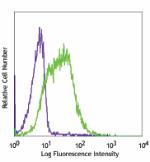
Mouse B7-H3 transfected P815 cells stained with MIH35 PE -
PE anti-mouse CD276 (B7-H3)

Mouse B7-H3 transfected P815 cells stained with MIH35 PE -
APC anti-mouse CD276 (B7-H3)
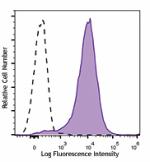
Mouse B7-H3-transfected P815 cells were stained with CD276 (... -
Biotin anti-mouse CD276 (B7-H3)
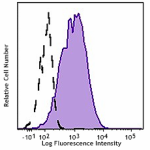
Mouse B7-H3-transfected P815 cells were stained with biotiny... -
PE/Dazzle™ 594 anti-mouse CD276 (B7-H3)
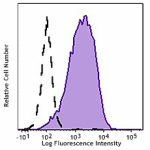
Mouse B7-H3-transfected P815 cells were stained with CD276 (... -
PE/Cyanine7 anti-mouse CD276 (B7-H3)
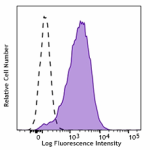
Mouse B7-H3-transfected P815 cells were stained with CD276 (... -
PerCP/Cyanine5.5 anti-mouse CD276 (B7-H3)
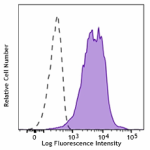
Mouse B7-H3-transfected P815 cells were stained with CD276 (... -
Ultra-LEAF™ Purified anti-mouse CD276 (B7-H3)
 Login / Register
Login / Register 






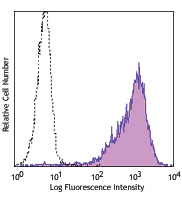
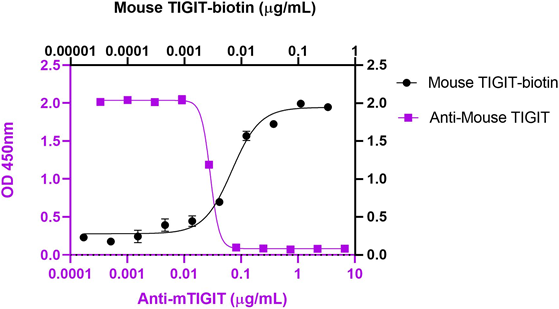





Follow Us